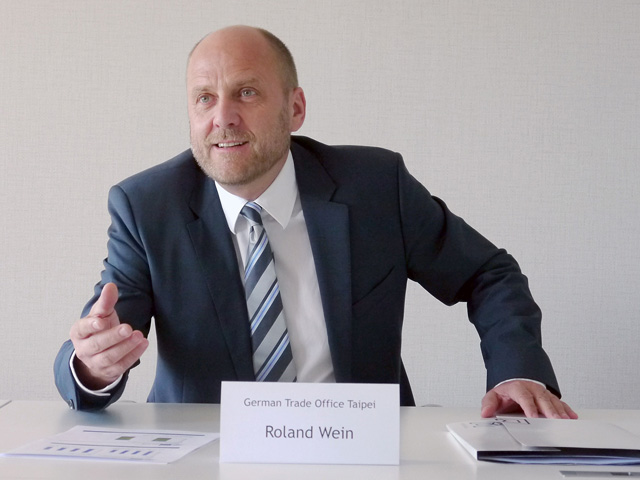Qualified Staff Hard to Find for German Firms in Taiwan: GTO Survey
2012/11/20 | By Quincy LiangMany Taiwanese engineers cannot speak English fluently to be promoted
Not many know 208 German companies operate in Taiwan, almost 20% of which with 100-plus employees. Moreover, a recent survey conducted by the German Trade Office Taipei (GTO) shows that many of these companies, despite the challenges posed by the recent peripheral EU zone debt crisis and slowing export out of Taiwan, the majority of the respondents remain optimistic about the local market.
An invaluable outcome of the survey is that some senior managers in the German firms proposed candidly suggestions for local industry development, also hoping the government would take them into serious consideration.
The GTO recently announced its survey findings from a poll conducted May 14 to June 8 this year. Among the 208 companies, over one-fourth of respondents plan to increase both investment and number of employees in 2012. The results also show that Taiwan continues to be an attractive market primarily for sales/marketing and services, with, however, the biggest challenge being recruiting and retaining qualified staff.
Taiwan is Important for German Companies
According to a special survey simultaneously conducted by the GTO and Germany Trade & Invest, most German companies in Taiwan are already benefitting from improved cross-strait economic relations and expect even more business opportunities in Taiwan and the region.
Almost one-fourth of respondents rank Taiwan among the three most important global markets in both sales and profit. Eighteen of the companies in Taiwan are headquarters for the Greater China region; while 62% of German companies reported turnovers exceeding NT$100 million (US$3.3 million) in 2011. Almost 75% of the German companies in Taiwan have been active locally for more than 10 years, and 47% of which have been in Taiwan for more than 15 years, showing stability as well as good long-term business, GTO says.
Sales Potential and Customer Proximity
Three of four German companies name local sales potential as the main reason for being in Taiwan, while two-thirds list proximity to key accounts as very important.
German companies in Taiwan mainly engage in sales/marketing and services, with machinery sales being by far the most important for German companies in Taiwan. While the machinery industry continues to see high sales potential, it is facing rapidly rising competition from Taiwanese companies.
The service industry is dominated by logistics firms. The German companies that manufacture in Taiwan (9%) operate in the automotive, mechanical and plant engineering and chemicals fields.
Biggest Challenge
Recruiting qualified staff is named as a problem or even major problem by more than 50% of the German companies, with other challenges being foreign exchange risk and retaining personnel, and increasing commodity and energy prices, labor costs and bureaucracy/administrative hurdles seen as less problematic.
A quarter of respondents expect this year improvement in economic conditions in Taiwan, with over 50% expecting to meet or even outperform company goals set for 2012. About 28% of the companies plan to increase investment in 2012, mainly targeting northern Taiwan and in particular Taipei, with main reasons being to follow key accounts and regional diversification; while over one third of respondents plan to hire new staff in 2012.
Cross-strait Relations
A special survey of the impact of improved cross-strait economic relations, conducted by GTO in cooperation with Germany Trade & Invest, shows that more than 50% of German companies in Taiwan already benefit from improved bilateral relations, with 35% of respondents benefitting from prioritized import tariff reductions realized by the Economic Cooperation Framework Agreement (ECFA). Some 51% expect to benefit from further tariff reductions, with almost half of the companies wishing for more import tariff reductions, 41% considering further opening of trade in services desirable, and 37% hoping employees from China can enter Taiwan more easily.
The majority of respondents will continue to pursue current Greater China Strategy, with one-fourth expecting headquarters to modify such Strategy to respond to improved conditions across the Taiwan Strait.
Executives' Opinions
Uwe Halstenbach, general manager, TUV Rheinland Taiwan Ltd., pointed out that the firm's most experienced Taiwanese engineers fear speaking English for lacking opportunity to practice, which reflects a problem in the local English education.
Helmut Felix Bolt, chief representative of ThyssenKrupp AG's office in Taiwan, echoed the same sentiment of Halstenbach. Some of his company's local employees, although able to speak English, cannot handle the language well enough to be promoted to senior level, which is a hindrance for such personnel have to communicate with the German headquarters and global colleagues.

Bolt warned impartially that both the Taiwan government and private sector should heed the trend of de-industrialization on the island, citing the recent example where a new petrochemical factory finally would be set up in Vietnam after over 10 years of discussion and negotiation.
Government limitation have minor effect on German companies in Taiwan, but problems will occur if most major investments flow out to other nations, said Bolt, whose firm has about 170,000 employees in around 80 nations, adding that the U.S. and U.K., both with shrinking production values, are examples that have been actively developing the service industry, to suggest the reality of de-industrialization.




